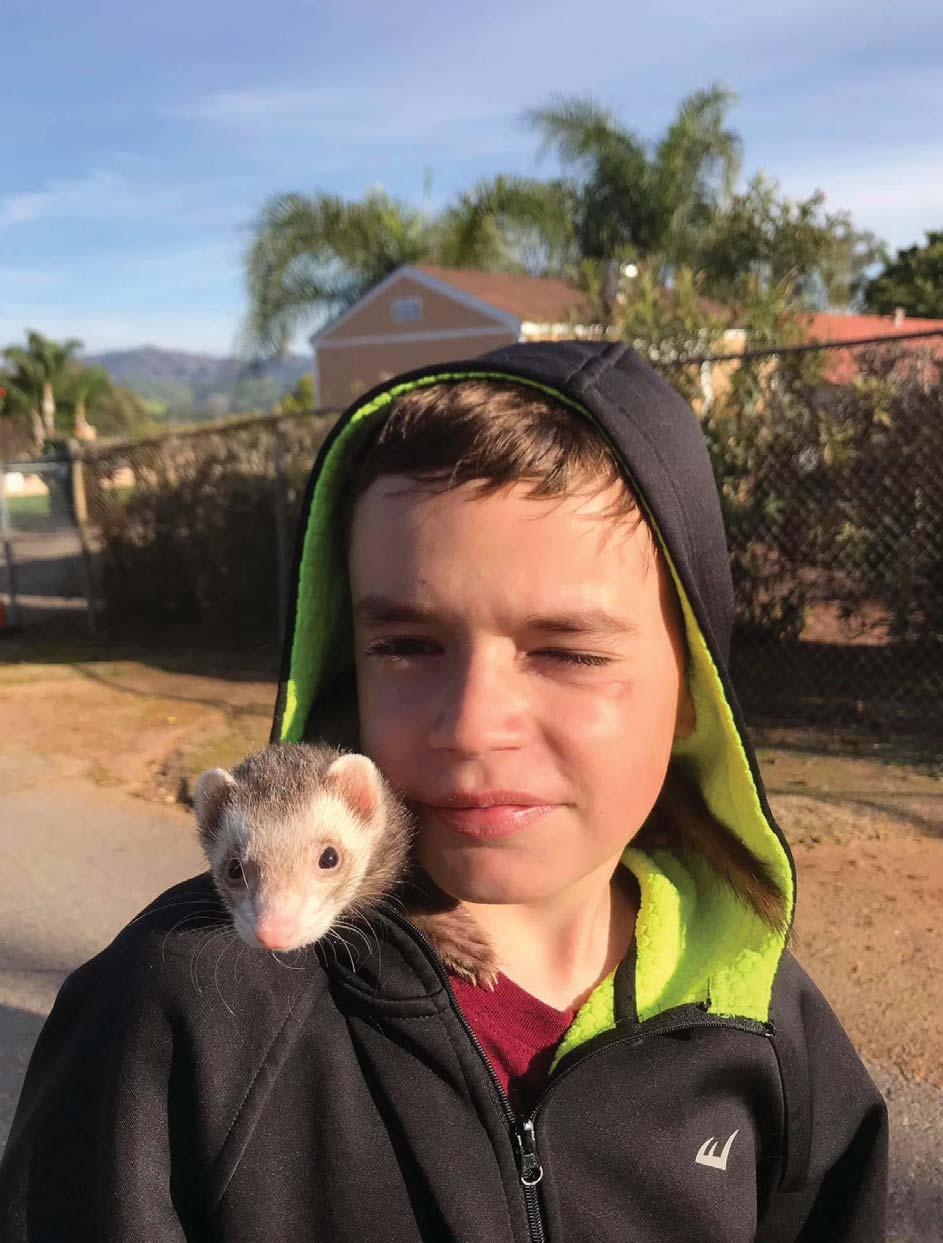
4 minute read
Ask a Ferret
Aaron Lee
Advertisement
I’ve got one quick and squiggly ferret that hates to be groomed. Do you have any tips or tricks to getting our ferret to stay still while we take care of him?
Ferrets’ nails need to be trimmed about every 4-6 weeks (mark your calendar as a reminder). The most important thing to remember is to only clip the very tip of the nail; never clip the pink area. However, if you do, apply a styptic powder quickly to stop it from bleeding. Ferrets do not want to sit still. There are a couple of ways that we’ve found that help. We encourage you to test each of them and see what you feel most comfortable with.
DISTRACTION: Distract your ferret with something that will keep him busy and interested. Try putting a little salmon oil or Furo-Vite ® on his belly. While he is focused on licking, clip his nails.
SCRUFFING: Scruff the back of your ferret’s neck with one hand and clip his nails with the other. This grip is not hurting your pet, much like it doesn’t hurt cats. It keeps them still and available to clip with little struggle.
HARNESS & LEAD: Some people just need to get a little control on their ferrets to allow them the space to do this. Make sure your harness is tight enough where your little Houdini won’t escape.
With all of these methods, allow your ferret to get familiar with what you are doing. Allow them to connect with you before you start. Present the clippers to them to sniff and taste. Then start your grooming.
Julia Roman Smith
We’ve got two older ferrets and have raised them on the Marshall Premium Diet. We are getting a baby in the next couple of weeks. Is there a special baby food for ferrets?
No Julia, there is not. While we do recommend that you stick with the Marshall Premium Diet, you cannot feed a baby ferret a dry diet. Their teeth cannot break down the pellet. All of their food should be a mushy consistency. One part food to three parts water will allow them to get the nutrients they need for those little bodies. You will do this until your ferret is finished teething and all of their adult teeth have come in, at about 14 weeks. When your ferret can chew the pellet, begin to wean them off of the mushy diet by adding less and less water at every serving until none is needed. Senior ferrets should be fed this mixture as well. This will keep your ferrets hydrated and your food supply will last longer.
Kimberly Marie
My female ferret (6 months) constantly digs the food and water out of the bowl. This wastes food and makes a mess. I used to keep her separated from my other two ferrets (both 3 years old), because they were picking up her bad habits. Recently, I put them back together and replaced their dish with a bottle feeder, but the dry mess still continues. What should I do?
You can try reducing the amount of food in their bowl. If you restrict your pets to just the amount of food for a single meal, they will be less likely to dig or play in it. You can also try separating them just to feed them. Only do this if you have to, as ferrets should have access to food and water at all times. I understand that busy schedules may make this hard, but once she is trained, you should be able to go back to leaving the food and water in their cage as recommended. Remember, ferrets are playful and get bored quickly. Provide them with enough toys to keep them busy during nap breaks in their cage, and interact with them as much as possible outside the cage to keep them entertained.
Laura Gedutis LeBarron
We rescued two Marshall ferrets from an abandonment situation. They are a year-old female and a 9-month-old boy. Both adjusted very well to our home and were box trained very quickly. In the last few weeks, both ferrets have started going outside the box on one of the shelves in their cage. Neither ever goes outside the cage. They do still use the box most of the time. Any suggestions on breaking this bad habit?
In a perfect world ferrets would come home from pet stores litter trained. Unfortunately, that isn’t always the case. I understand that your ferrets use the box most of the time, but we recommend reinforcing the litter training to help break the bad habit in their cage.
HERE ARE SOME TIPS FOR LITTER TRAINING YOUR FERRETS:
When starting to litter train, limit your ferret’s area to a small section such as his cage or a playpen. The playpen makes it very easy for you to reach in and quickly place the pet into the high-back litter pan if you see the ferret starting to back up and go. The round shape of the playpen is a great training tool because it eliminates the temptation of backing up into a corner. It also gives you an open top in which to quickly move a ferret into the high-back litter pan.
If your shelf in the cage has a corner, this may be the temptation for them to use it. Deter your ferret from using that corner with corner deterrent springs or crumpled up newspaper. If your ferrets can’t back up there, they will not feel comfortable relieving themselves there.
Repetition and praise is key. Keep close observation of your ferret while litter training. We recommend the book Ferrets for Dummies as a great reference tool.








